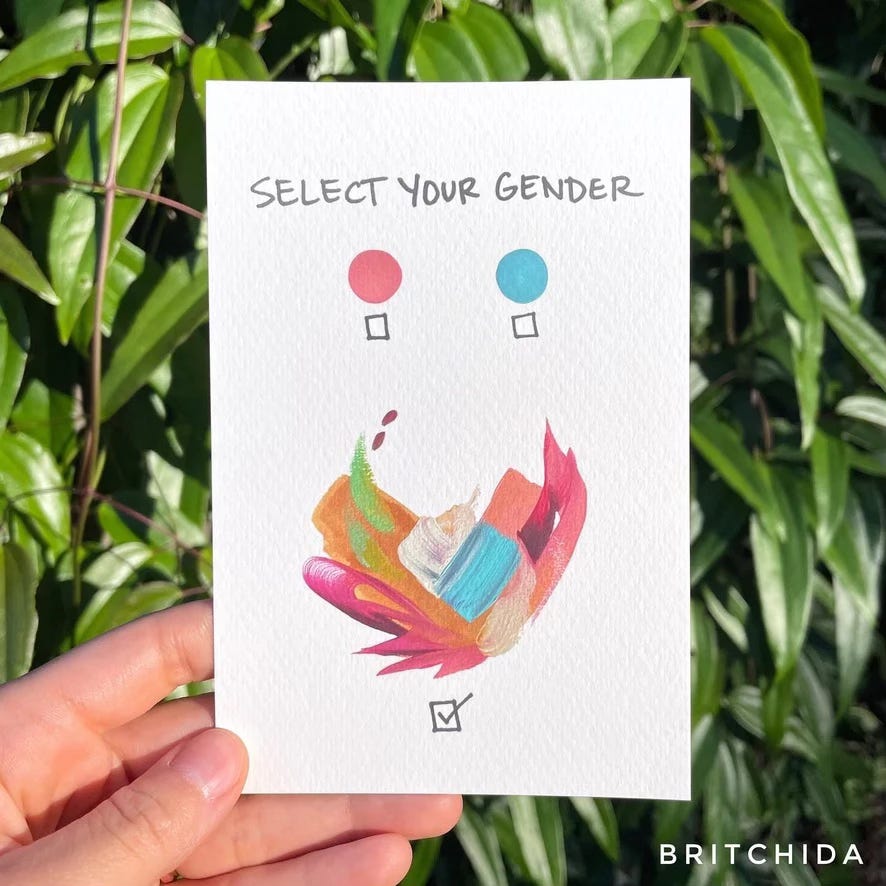🌈 revisiting gender
your creative weekend prompt exclusively for paid subscribers

This weekend’s exploration is a reboot/replay/repost of sorts. Earlier this week, I posted about understandable blindspots those of us in GenX might have around gender. (Understandable = yes. Pleading ignorance in this day and age = no, thank you.) I wrote about transphobia and trans-exclusionary behavior — even inside the LGBTQIA+ community and about the freedom we ALL have to explore our own specific gender identities and gender expressions.
I want to re-invite you into a fun and thought-provoking exploration this weekend around your very own gender exploration…
Glennon Doyle talked about exploring her own gender on her podcast (episode 208) and brought up some excellent points that I want to share with you (via the podcast transcript) before we delve into a writing prompt. Doyle said:
“I just can’t find gender in me. I can only find it on me… One of the things that my whole life people have been telling me I am, and even I have to say I am a girl, a woman. When I investigate that word or concept after the words I am, I cannot find it anywhere inside of me. If someone says to me, how do you know you are a girl or a woman? And I try to dive inward to dredge up something inside of me that makes that concept real, I cannot find it. When you ask me how do I know I’m a girl? I would tell you, well, I have boobs. I have a vulva and a vagina, I have a uterus. I have long hair, I have a closet full of these clothes. I have a certain voice…
So I guess what I can say is gender is something that I express on the outside of me with makeup and hair and clothes and even personality traits, all of these things, but I don’t feel it on the inside at all. It’s like I’m playing a role because somebody has handed me a part when I was born. You are a girl and they’ve given me a character description of what is acceptable for this role that I’m playing and what will be rewarded and what will be punished. And they’ve given me a costume and they’ve given me a dialogue. And it’s mostly an act. And I am a good actor. I look very, very femme. I act very femme in a lot of ways. But that is not because I feel that on the inside. That’s because I am good at playing a role. I feel like when I was born, if you gave me a bunch of different things and said, boy, man, whatever, I could play that role, I would’ve nailed that. So maybe it’s different for other people and maybe some other people do feel gender on the inside…
When we say, well, I’m wearing these heels and these earrings and this mascara because I’m a girl, maybe what we want to express on a deeper level is that we’re trying to express human characteristics that the world has told us is girl. So maybe on the inside I’m trying to express tenderness and whimsy and vulnerability and softness and nobility and elegance. And I have been told that these certain costume choices express those things. So I say I’m expressing gender, but what I’m really expressing is these bucket of human characteristics that for example, maybe when I’m wanting to wear that suit or those sneakers there, whatever, and I’m saying, boy, what I’m trying to express from the inside out is roughness and toughness and scrappiness and invulnerability and the ability to take up space and strength. But all we have to express those are what we’ve been told is gender. So we say, I’m expressing boy, I’m expressing girl. But what’s beneath that is this just desire to express the full spectrum of being human.”
Let’s explore our own genders
Locate your journal, open a new document on your computer to type your responses, or simply jot your writing on scrap paper for a set of writing prompts. Set a timer and write for 3-5 minutes on each question:
Keep reading with a 7-day free trial
Subscribe to prism by jen berlingo to keep reading this post and get 7 days of free access to the full post archives.





